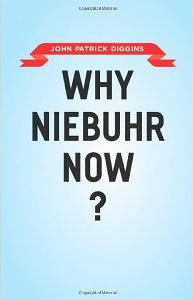Book Notes
 John Patrick Diggins, Why Niebuhr Now? (Chicago: University of Chicago Press, 2011), 136pp.
John Patrick Diggins, Why Niebuhr Now? (Chicago: University of Chicago Press, 2011), 136pp.
Reinhold Niebuhr (1892–1971) was arguably the most important American theologian of his generation. His life spanned a remarkable period of American history that was grist for his fertile reflections on the meaning of history and the nature of humanity. Niebuhr came of age during the first world war, lived through the Depression, experienced the second world war, the Holocaust, the Spanish civil war, the Korean war, Vietnam, the landing on the moon, and then the so-called Cold War. He defied easy categorization; his thought was imaginative enough to "outrage conservatives and upset radicals." Many more, equally diverse, also appealed to his thought for the trajectories of their own ideas.
John Diggins was a professor of history at City University of New York. This was the last book he wrote; he completed the manuscript before he died in January of 2009. Diggins lost his Catholic faith in the 1950s, but he retained a deep appreciation for Niebuhr's unique contributions to political discourse, especially as they found expression in Niebuhr's embrace of paradox and mystery.
For Niebuhr, humanity's problem is not ignorance, class or property, but rather the corruption of human nature or what the Bible calls sin. We're confronted with "the limits of knowledge and the necessity of faith." We're stuck between the lust for power and the call of virtue, the quest for freedom and the forces of fate, life and death, self-sacrifice and self-love. This moral ambiguity characterizes individuals and especially nations. Niebuhr believed that while individuals can be moral, nations and societies are inevitably immoral. This meant that there was "an inevitable and tragic conflict" between the one and the many (44).
Niebuhr was deeply suspicious about national claims of virtue. He was a realist who questioned political and moral idealism. As Diggins puts it, "Niebuhr addresses the realities of human affairs and demonstrates that until we consider certain Christian insights about human nature, we can never understand the nature of power in history" (117). And that's why we need Niebuhr today.


